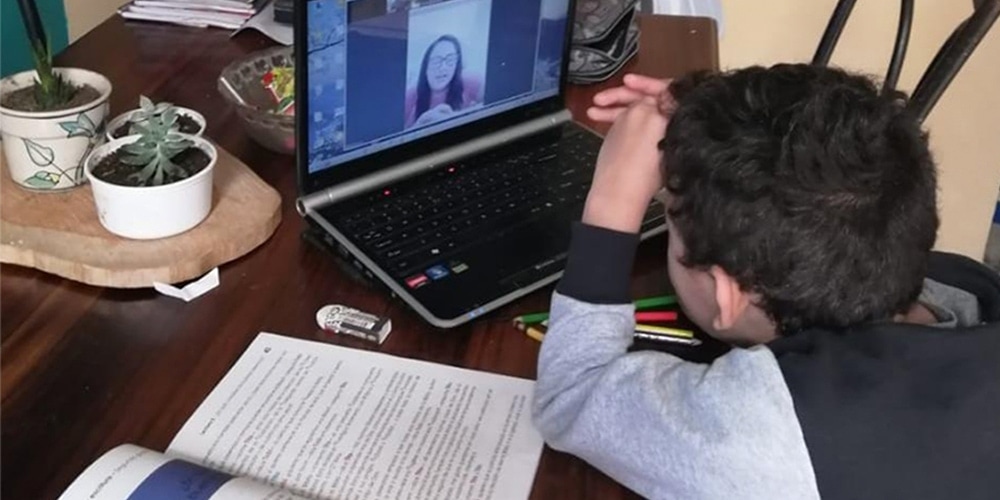
It’s 6:30 on a Monday morning, and Karla Leon turns on her computer. She’s not sure when she will turn it off that day.
Leon is a second-grade teacher at the Adventist Bilingual Educational Center in Hatillo, San José, Costa Rica. A teacher’s meeting will take place until 7:15 a.m. At 7:30 a.m. she will greet her 18 students on Zoom and play the devotional segment she recorded the night before. Zoom classes will continue until 3:00 p.m. Then she will correct assignments, assess her students’ progress, answer parents’ calls, and perhaps teach a Bible study to a parent who has been listening in on the devotionals every morning at breakfast time.
In the evening Leon will prepare for the next day’s devotional, Bible class, and the rest of the classes that will follow. She’s also studying for her master’s degree, which is currently being taught online.
The “New Normal”
This kind of day has been the new normal for Leon since the lockdown began in March 2020.
“We sent out enough school worksheets and assignments for two weeks, thinking that this pandemic crisis would last maybe until the end of March, and here we are. Our students are entirely distance learning for months now,” Leon said.
Fortunately, the school has provided communication and grades online, and students had taken part in English exercises on their mobile devices in previous school years. So in that respect, Leon said, the transition to all-online learning has been a relatively easy adjustment.
“We are thankful that our community has technological possibilities,” she said. “In fact, when students enroll at the school, they must have access to a tablet, computer, or cell phone.”
More Tech Savvy
Even with the easy transition, Leon has had to learn to be more tech savvy, more innovative and creative to better engage young students in the “new normal.”
With the switch to all online teaching, Leon said, the hours after school seem to blur into the night hours. “We don’t really have an eight-hour shift. It seems like we are teachers 24/7. Even on the weekends, I have had to teach parents what sundown Friday to sundown Saturday means for a Seventh-day Adventist.”
According to Xenia Gamboa de Burgos, principal of Adventist Bilingual Education Center, 830 students are enrolled in the current school year, 197 of which are Seventh-day Adventists, or 23 percent of the student body. With 87 teachers and staff, Adventist education is at the heart of their mission, Gamboa said.
Clearer Mission
For Leon, the mission of Adventist education in the school has never been more clear. In the 14 years she has been teaching at the school, the pandemic has highlighted the Bible's power and the message of salvation to her 18 pupils. Only two of her students come from Seventh-day Adventist homes.
“I know God has a purpose in my life through all this,” Leon said. That purpose has been visible as more and more parents call her with Bible questions. “‘We eat breakfast while watching your devotional every day,’ parents tell me,” she said. This has forced her to transition her devotionals to more of a family theme. It’s not just students and their parents who follow her devotionals, but their younger siblings too.
“One particular mom wanted to learn more about the Bible, and sometimes we would talk until midnight,” Leon said. Talks followed with Bible studies on keeping the Sabbath and reading of Steps to Christ by Ellen G. White, a co-founder of the Seventh-day Adventist Church.
Leon, 39, who is married and has two young girls at the same school, grew up in a Seventh-day Adventist home. She was active in the church, studied at the school where she now teaches, and always dreamed of sowing the seed of Jesus in young children. “I believe God can use you in a mighty way,” she said. “And I believe that, more than ever, we are like missionaries during this time, not only with our students but entire families.”
Planting the Seed
It’s not only about a Bible class or a devotional message; it’s also about an aggressive campaign that not only positions you as a teacher, psychologist, friend, and counselor but also as a witness to the wonderful blessings God has given, Leon said. “The Word of God is a seed planted to children and their parents.”
“I feel much more committed to reinventing myself in the biblical sense, because you cannot just convince non-believers or professional persons very easily,” she said. “You have to have a foundation, and when individuals are more educated professionally, they seem to have questions or concerns.”
She said she misses her students and looks forward to getting back to her classroom.
“There’s nothing better than getting a hug from a child who comes from recess all sweaty and shares love and wants to express his or her gratitude,” Leon said. “It’s so satisfying to know that I’ve been teaching them how to pray, how to forgive, how to love Jesus, and how to read so they can turn into independent little persons. That’s priceless to me.”
For now, Leon, as well as the dozens of teachers at her school and throughout the hundreds of schools across the Adventist educational system throughout the Inter-American Division, work tirelessly to teach young people not only to excel academically but to thrive in their spiritual lives.
“We must testify. We cannot keep silent now. We must share the wonderful blessings God has given us wherever we are, but especially in the Adventist educational system, where so many lives can be transformed for good,” Leon said.
The original version of this story was posted on the Inter-American Division news site.